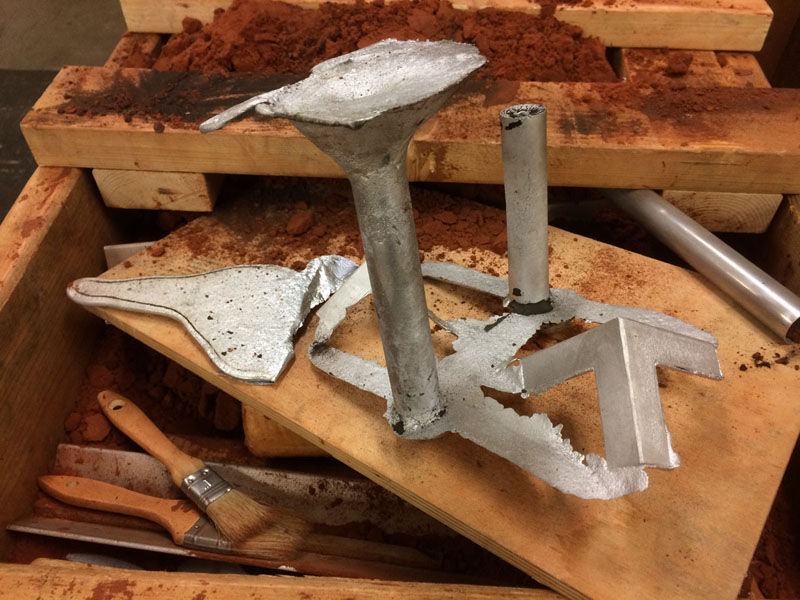The Ultimate Guide To Alcast Company
The Ultimate Guide To Alcast Company
Blog Article
Alcast Company Fundamentals Explained
Table of ContentsAlcast Company Fundamentals ExplainedAlcast Company Fundamentals ExplainedAlcast Company Fundamentals ExplainedOur Alcast Company DiariesRumored Buzz on Alcast CompanyNot known Facts About Alcast Company
The subtle distinction hinges on the chemical web content. Chemical Contrast of Cast Aluminum Alloys Silicon promotes castability by reducing the alloy's melting temperature and enhancing fluidity during casting. It plays an essential duty in permitting intricate molds to be filled precisely. Furthermore, silicon adds to the alloy's stamina and put on resistance, making it valuable in applications where sturdiness is crucial, such as vehicle components and engine elements.It likewise enhances the machinability of the alloy, making it less complicated to refine into ended up products. In this means, iron adds to the general workability of aluminum alloys.
Manganese contributes to the strength of light weight aluminum alloys and boosts workability. Magnesium is a lightweight component that supplies strength and effect resistance to light weight aluminum alloys.
Alcast Company Fundamentals Explained
Zinc boosts the castability of light weight aluminum alloys and aids regulate the solidification process during casting. It improves the alloy's strength and solidity.

The key thermal conductivity, tensile toughness, return stamina, and prolongation vary. Among the above alloys, A356 has the highest thermal conductivity, and A380 and ADC12 have the most affordable.
The Alcast Company Statements

In accuracy casting, 6063 is appropriate for applications where detailed geometries and top notch surface area finishes are vital. Instances include telecommunication rooms, where the alloy's remarkable formability enables sleek and aesthetically pleasing designs while keeping architectural stability. In a similar way, in the Lighting Solutions industry, precision-cast 6063 components create sophisticated and reliable lights fixtures that require elaborate forms and great thermal efficiency.
The A360 shows remarkable elongation, making it optimal for complex and thin-walled parts. In accuracy casting applications, A360 is well-suited for industries such as Customer Electronics, Telecommunication, and Power Tools.
10 Simple Techniques For Alcast Company
Its unique residential properties make A360 an important option for precision spreading in these industries, improving product longevity and high quality. Aluminum Castings. Aluminum alloy 380, or A380, is a widely made use of spreading alloy with several unique attributes.
In accuracy casting, aluminum 413 radiates in the Customer Electronics and Power Tools sectors. It's generally utilized to craft complex parts like smartphone housings, electronic camera bodies, and power tool housings. Its precision is remarkable, with tight resistances as much as 0.01 mm, guaranteeing perfect you can find out more product assembly. This alloy's superior corrosion resistance makes it an outstanding option for outdoor applications, making certain long-lasting, long lasting products in the pointed out sectors.
Top Guidelines Of Alcast Company
Once you have actually chosen that the aluminum die casting procedure appropriates for your project, a vital next step is choosing the most suitable alloy. The light weight aluminum alloy you pick will significantly influence both the spreading procedure and the properties of the end product. As a result of this, you should make your decision thoroughly and take an educated strategy.
Determining one of the most appropriate aluminum alloy for your application will certainly mean weighing a wide range of attributes. These relative alloy attributes adhere to the North American Pass Away Spreading Association's standards, and we've divided them right into 2 categories. The very first group addresses alloy characteristics that impact the production process. The second covers qualities impacting the homes of the end product.
The Buzz on Alcast Company
The alloy you choose for die spreading straight affects a number of aspects of the casting procedure, like just how very easy the alloy is to function with and if it is vulnerable to casting problems. Warm breaking, additionally referred to as solidification splitting, is a typical die spreading problem for light weight aluminum alloys that can lead to interior or surface-level rips or cracks.
Specific light weight aluminum alloys are much more prone to hot fracturing than others, and your choice ought to consider this. Another common defect found in the die spreading of light weight aluminum is pass away soldering, which is when the cast sticks to the die wall surfaces and makes ejection tough. It can damage both the actors and the die, so you must search for alloys with high anti-soldering buildings.
Rust resistance, which is currently a notable characteristic of light weight aluminum, can differ substantially from alloy to alloy and is a vital characteristic to take into consideration depending on the ecological problems your item will certainly be exposed to (Casting Foundry). Use resistance is another residential property generally sought in aluminum items and can separate some alloys
Report this page